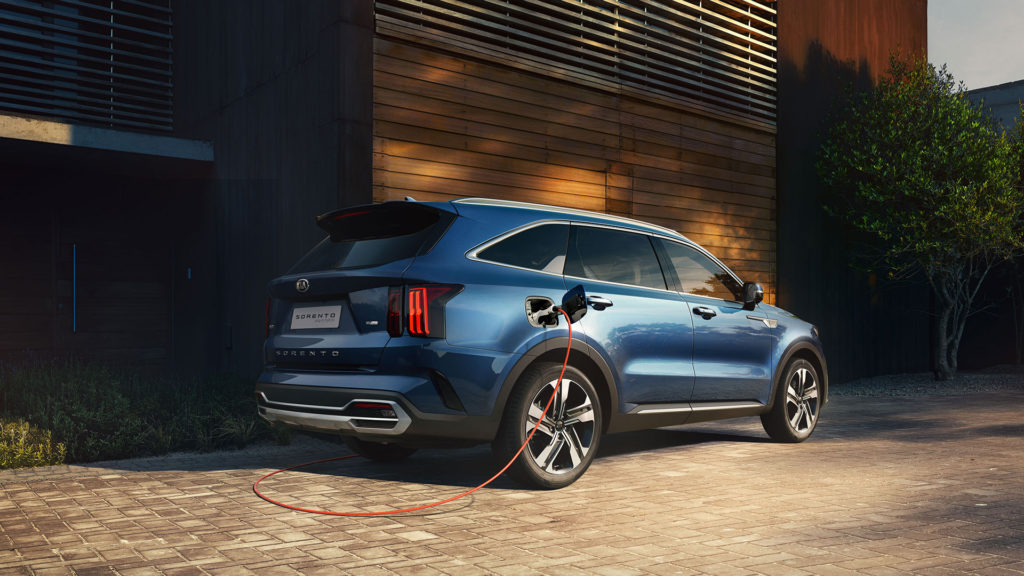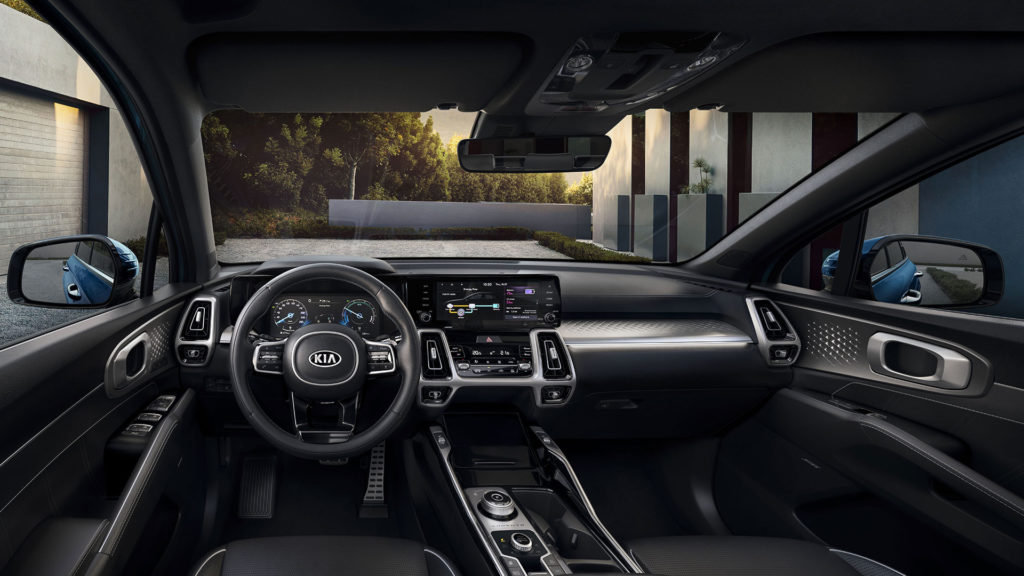
Kia Motors has this week revealed the new Kia Sorento Plug-in Hybrid for first time, an ultra-low emissions version of the brand’s flagship global SUV. The new variant combines supreme practicality with low running costs and high power, and broadens the appeal for the D-segment SUV.
The new Sorento Plug-in Hybrid is the second electrified model in the new Sorento line-up, and sits alongside the low-emissions Sorento Hybrid. The new variant combines a powerful turbocharged gasoline engine with a high capacity battery pack and high output electric motor, giving drivers the ability to complete shorter drives on all-electric, zero-emissions power.
The Plug-in Hybrid variant achieves this while maximising space and versatility, with the innovative platform that underpins the fourth-generation Sorento designed from the outset to accommodate electrified powertrains.
The new platform and large body ensures the Plug-in Hybrid model retains the generous cabin and luggage space and five- and seven-seat layouts that define other models in the line-up.
Pablo Martinez Masip, Director of Product Planning and Pricing at Kia Motors Europe, comments: “The Sorento Plug-in Hybrid completes the new fourth-generation Sorento line-up, and is one of two electrified models available to European drivers. It deploys a turbo hybrid powertrain to boost performance, while reducing the car’s environmental impact and running costs.
“Plug-in models continue to grow in popularity across Europe, and the new Sorento will be one of the most spacious, practical and versatile electrified models available.”
In the first half of 2020, electrified models – including mild-hybrid, parallel hybrid, battery electric and plug-in hybrid vehicles – accounted for around one in four of all Kia vehicles sold in Europe, with sales accelerating year-on-year.
Sales of the new Sorento Plug-in Hybrid will commence in select European markets in early 2021, with Kia’s unique 7-Year, 150,000-kilometre warranty as standard.
High-power, low emissions
The Sorento Plug-in Hybrid isn’t just the lowest-emitting model in the Sorento line-up in Europe, but also the most powerful. The beating heart of its ‘turbo hybrid’ powertrain is its 1.6-litre T-GDi (turbocharged gasoline direct injection) engine, which, on its own, produces up to 180 ps and 265 Nm torque.
The engine is paired with a high-capacity 13.8 kWh lithium-ion polymer battery pack and a powerful electric motor which produces 66.9 kW and 304 Nm torque.
Combined, these powertrain components enable the Sorento Plug-in Hybrid’s powertrain to produce up to 265 ps and 350 Nm torque.
The Sorento Plug-in Hybrid’s all-electric range will be sufficient to enable drivers to complete most short drives on electric power alone. Its all-electric range and CO2 emissions are pending homologation and will be confirmed by Kia closer to the car’s on-sale date.

Power is sent to all four wheels through a six-speed automatic transmission. The transmission allows the full power of the engine and motor to be transferred in parallel, with minimal loss of energy.
The result is immediate acceleration responses at any speed, and direct access to available battery power at higher speeds.
A range of innovations throughout the powertrain also ensure the Sorento Plug-in Hybrid is the most advanced, efficient PHEV to-date from Kia.
The new model represents Kia’s first use of an independent battery pack water-cooling system in a PHEV, ensuring optimal heat management and efficiency for the high-voltage battery pack.
For the 66.9 kW electric motor, the rotor benefits from a new two-stage lamination process to reduce noise and vibration levels.
The engine features Kia’s latest ‘Smartstream’ innovations, including Continuously Variable Valve Duration technology, which regulates the duration that the intake valves open and close depending on driving conditions. This enables the engine to operate on different combustion cycles, seamlessly optimising engine performance and fuel efficiency.
Design and packaging
Kia’s new midsized SUV platform, introduced with the fourth-generation Sorento and underpinning the new Plug-in Hybrid model, plays a key role in accommodating the new powertrain.
Its innovative structure and layout maximises space for passengers and luggage, with the battery pack located beneath the floor of the cabin.
As a result, the Sorento Plug-in Hybrid offers generous space for up to five or seven passengers as its Hybrid and diesel counterparts.
It also offers one of the largest cargo capacities in its class, with the larger battery back not taking up significant amounts of boot space – up to 809 litres (for seven-seat models) or 898 litres (five-seat models) with two rows of seats in place.
In seven-seat models, with all seven seats in place, boot space is 175 litres (compared to 179 litres for its Hybrid counterpart).
Visually, Sorento Plug-in Hybrid models retain the same modern exterior design as other variants in the line-up, with ‘eco plug-in’ badges and a charging port on the rear quarters standing out as the only points of differentiation.

Inside, the cabin also remains largely unchanged, although the 12.3-inch fully-digital instrument cluster is redesigned, with new graphics and dials to provide drivers with a clear picture of the powertrain’s status.
It enables drivers to keep track of the battery’s state of charge, as well as the flow of electric and gasoline power through the powertrain.
The 10.25-inch touchscreen infotainment system also features new functionality to enable drivers to easily locate vehicle charging points on-the-go.
The same comprehensive range of ‘connected car’ and safety technology
The Sorento Plug-in Hybrid offers the same high level of technological innovation as other Sorento models. The touchscreen infotainment system enables full, seamless smartphone integration with Apple CarPlay™ and Android Auto™.
A powerful 12-speaker BOSE® surround-sound audio system is also available, delivering a more immersive sound to all passengers, as well as a cabin Mood Lighting system, with up to 64 colours for users to choose from.
It also offers Kia’s innovative UVO Connect telematics system, connecting drivers by providing invaluable information via the in-car touchscreen and on their smartphone.
Featuring Kia Live services provide drivers with live traffic information, weather forecasts, points of interest, and details of potential on- and off-street parking (including price, location and parking availability) – in addition to nearby vehicle charging points.
UVO Connect also enables drivers to send route directions to their car before a journey, and check the location of their vehicle at any time.
The Sorento Plug-in Hybrid offers a range of Kia’s Advanced Driver Assistance Systems (ADAS) to help reduce many of the inherent hazards and stresses of driving.
Available technologies include Forward Collision-Avoidance Assist (FCA) technology with pedestrian, cyclist and vehicle detection and FCA Junction, which detects vehicles at junctions when turning; Blind-Spot View Monitor (BVM); Surround View Monitor (SVM) and Blind-spot Collision-Avoidance Assist (BCA); Intelligent Speed Limit Assist (ISLA); Smart Cruise Control with Stop&Go (SCC) and Navigation-based SCC (NSCC); Lane Following Assist (LFA); Driver Attention Warning (DAW); and Highway Driving Assist (HDA).
It also offers a Rear View Monitor (RVM) with Reverse Parking Collision-Avoidance Assist (PCA) and Rear Cross-traffic Collision-Avoidance Assist (RCCA).
The Sorento’s Safe Exit Assist (SAE) feature also prevents rear doors from opening if the vehicle detects a hazard approaching from behind, such as a cyclist or another vehicle.
The new Sorento also implements Kia’s first Multi-Collision Brake system, which enables the Sorento to mitigate the severity of secondary collisions. It automatically applies vehicle brakes when the airbags have been deployed after an initial collision, further protecting occupants from secondary frontal or side impacts.
Sales commence in 2021 with Kia’s 7-Year, 150,000 km warranty included
The new Sorento Plug-in Hybrid will be built for Europe and many other markets at Kia’s Hwasung manufacturing facility in Korea. European sales are due to commence in early 2021 in select markets.
Every model sold in Europe will offer Kia’s unique seven-year, 150,000-kilometre warranty as standard, extending to cover the battery pack and motor.








